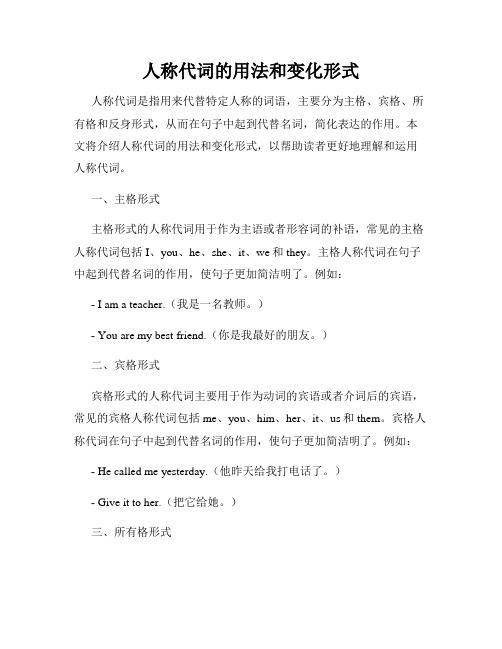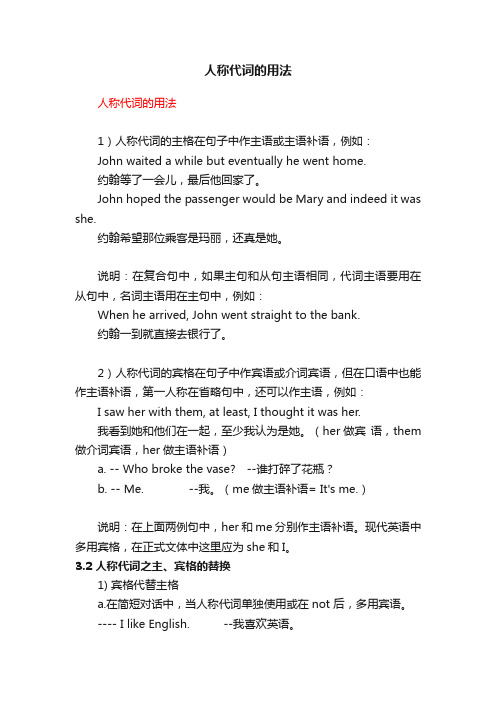最新英语人称代词的用法
人称代词的用法和变化形式

人称代词的用法和变化形式人称代词是指用来代替特定人称的词语,主要分为主格、宾格、所有格和反身形式,从而在句子中起到代替名词,简化表达的作用。
本文将介绍人称代词的用法和变化形式,以帮助读者更好地理解和运用人称代词。
一、主格形式主格形式的人称代词用于作为主语或者形容词的补语,常见的主格人称代词包括I、you、he、she、it、we和they。
主格人称代词在句子中起到代替名词的作用,使句子更加简洁明了。
例如:- I am a teacher.(我是一名教师。
)- You are my best friend.(你是我最好的朋友。
)二、宾格形式宾格形式的人称代词主要用于作为动词的宾语或者介词后的宾语,常见的宾格人称代词包括me、you、him、her、it、us和them。
宾格人称代词在句子中起到代替名词的作用,使句子更加简洁明了。
例如:- He called me yesterday.(他昨天给我打电话了。
)- Give it to her.(把它给她。
)三、所有格形式所有格形式的人称代词用于表示所有关系,常见的所有格人称代词包括my、your、his、her、its、our和their。
所有格人称代词在句子中起到代替名词加以所有关系的作用,使句子更加简洁明了。
例如:- This is my book.(这是我的书。
)- Our dog is very cute.(我们的狗很可爱。
)四、反身形式反身形式的人称代词用于强调或者表示自己,常见的反身人称代词包括myself、yourself、himself、herself、itself、ourselves和themselves。
反身人称代词在句子中起到指代自身的作用,使句子更加生动有力。
例如:- I hurt myself while exercising.(我在锻炼时弄伤了自己。
)- They can take care of themselves.(他们可以照顾好自己。
英语人称代词的用法归纳总结

英语人称代词是指用来代替人或事物的代词。
根据在句子中的作用和所代替的人或事物的不同,英语人称代词可分为主格、宾格、所有格和反身代词。
以下是英语人称代词的用法归纳总结:1. 主格代词主格代词在句子中充当主语,表示动作的执行者。
常见的主格代词有I、you、he、she、it、we和they。
例如:I am a teacher.(我是一名老师。
)You are my friend.(你是我的朋友。
)He is reading a book.(他正在看书。
)She loves playing the piano.(她喜欢弹钢琴。
)It is a beautiful day.(今天天气很好。
)We are going to the cinema.(我们要去电影院。
)They are studying English.(他们正在学习英语。
)2. 宾格代词宾格代词在句子中充当宾语,表示动作的承受者或受益者。
常见的宾格代词有me、you、him、her、it、us和them。
例如:He gave me a present.(他送给了我一份礼物。
)She talked to him for hours.(她和他聊了几个小时。
)I can see her.(我能看见她。
)Please give it to us.(请把它给我们。
)They invited them to the party.(他们邀请了他们参加聚会。
)3. 所有格代词所有格代词用来表示所属关系,常见的有my、your、his、her、its、our和their。
例如:This is my book.(这是我的书。
)Is this your phone?(这是你的手机吗?)His car is parked outside.(他的车停在外面。
)The cat licked its paws.(猫舔了舔它的爪子。
)Our house is on the corner.(我们的房子在拐角处。
最新英语人称代词表格和用法

英语人称代词表格和用法(可以直接使用,可编辑优秀版资料,欢迎下载)英语人称代词表格和用法英语人称代词是指直接指代人或者事物的代词.在英语和汉语中都有三种人称代词,即:第一人称(我;我们),第二人称(你;你们),第三人称(他、她、它;他们、她们、它们).根据人称代词在句中所充当的成分可以分为主格人称代词、宾格人称代词。
另外,人称代词有单复数之分,特别是第二人称单复数写法都是一致的,实际翻译时应当注意。
英语人称代词表格第一人称代词1。
第一人称代词主格"I” "we"例句1:I made a big mistake。
我犯了一个大错误。
注释:主格人称代词"I"在句中充当主语。
例句2:We met by chance。
我们偶然相遇。
注释:主格人称代词"we"在句中充当主语。
2. 第一人称代词宾格”me” "us"例句1:Would you please give me a hand? 你能不能帮我一把?注释:宾格人称代词"me"在句中充当动词”give"的宾语。
例句2:Bad habits will prevent us from stepping forward。
坏习惯会阻挡我们前进的步伐。
注释:宾格人称代词”us"在句中充当动词"prevent”的宾语。
第二人称代词1。
第二人称代词主格"you"(你), "you”(你们)例句1:You have a natural gift for math. 你很有数学天赋。
注释:第二人称代词主格"you"在句中充当主语。
例句2:You are all good students. 你们都是好学生。
注释:第二人称代词主格”you”在句中充当主语。
本句话是复数,指代"你们"。
人称代词的用法

人称代词的用法人称代词的用法集锦导语:人称代词是指直接指代人或者事物的代词。
下面是小编为您收集整理的人称代词的用法,欢迎阅读!人称代词的用法:1、主格用来作句子的.主语、表语。
如:I often go shopping on Sundays.(星期天我常去购物。
)Are they from Brazil?(他们是巴西人吗?)Where have they gone?(他们上哪儿去了?)That' s it.(就那么回事。
)It' s he!(是他!)2、宾格用来作及物动词或者介词的宾语。
如:Who teaches you English this year?(今年谁教你们的英语?)Help me!(救救我!)We often write letters to her.(我们常给他写信。
)3、人称代词作表语或者放在比较状语从句连词than或as之后时,可以用主格形式,也可以用宾格形式,口语中大多用宾格。
如:- Who is it?(是谁?) – It' s I/me.(是我。
)4、三个不同人称同时出现,或者主语中包含“我”时,按照“you→he→I”的顺序表达。
如:Both he and I are working at that computer company.(我和他都在那家电脑公司上班。
)– Who will go there?(谁要去那儿?)– You and me.(你和我。
)5、人称代词it除了可以指人指物之外,还可以表示“时间、天气、温度、距离、情况”等含义,此外还可以作“非人称代词”使用,替代作主语或者宾语的不定式、动名词或者名词性从句。
如:- What' s the weather like today?(今天天气怎样?)- It' s fine.(天气晴好。
)- What' s the time?(几点啦?) – It' s 12:00.(12点。
人称代词的用法及例句

人称代词的用法及例句一、人称代词的基本概念和分类人称代词是指用来替代表示人的名词或代词的一种词类。
它们用于句子中作主语、宾语、宾格补足语等,起到简化句子结构和避免重复使用特定名词的作用。
1. 第一人称代词:指说话者自己。
例如:I(我)、we(我们)。
2. 第二人称代词:指与说话者交谈的对象。
例如:you(你、你们)。
3. 第三人称代词:指除了说话者和听话者以外的人或事物。
例如:he(他)、she(她)、it(它)。
二、主格人称代词的使用主格人称代词在句子中作为主语出现,代表实际存在的人或事物。
1. 第一人称单数主格代词“I”表示说话者自己,常见于口头和书面英语中。
例如:“I love reading books.” (我喜欢读书)2. 第一人称复数主格代词“we”用于多个说话者,也可表示包括说话者和听话者在内的多个人。
例如:“We are going to a party.” (我们要去参加派对)3. 第二人称单数和复数主格代词“you”用于直接对话的对象。
例如:“You aremy best friend.” (你是我最好的朋友)4. 第三人称主格代词分别为“he”(他)、“she”(她)和“it”(它)。
例如:“He is a doctor.”(他是一名医生)三、宾格人称代词的使用宾格人称代词用于句子中作为动词或介词的宾语。
1. 第一人称单数宾格代词“me”表示说话者自己,多用于被动语态或介词后。
例如:“They invited me to their party.” (他们邀请我参加他们的派对)2. 第一人称复数宾格代词“us”用于多个说话者,也可表示包括说话者和听话者在内的多个人。
例如:“Please give us some advice.” (请给我们提供一些建议)3. 第二人称单数和复数宾格代词“you”用于直接对话的对象。
例如:“I miss you.” (我想念你)4. 第三人称宾格代词分别为“him”(他)、“her”(她)和“it”(它)。
人称代词用法大全汇总

人称代词用法大全汇总人称代词是指用来代替特定人或事物的代词。
在英语中,人称代词分为主格、宾格、所有格和反身代词四种形式。
下面是人称代词的用法大全汇总。
一、主格人称代词主格人称代词用来作为句子的主语或者主语补足语。
主格人称代词有以下几种形式:1. 第一人称单数:I例句:I like to read books.2. 第二人称单数:you例句:You are a talented musician.3. 第三人称单数:he/she/it例句:She is a teacher.4. 第一人称复数:we例句:We are going to the park.5. 第二人称复数:you例句:You guys are my best friends.6. 第三人称复数:they例句:They are studying for the exam.二、宾格人称代词宾格人称代词用来作为动词的宾语或者介词的宾语。
宾格人称代词有以下几种形式:1. 第一人称单数:me例句:John called me yesterday.2. 第二人称单数:you例句:I saw you at the mall.3. 第三人称单数:him/her/it例句:Mary loves him.4. 第一人称复数:us例句:Please invite us to the party.5. 第二人称复数:you例句:They are waiting for you.6. 第三人称复数:them例句:I lent them my car.三、所有格人称代词所有格人称代词用来表示所属关系或者所有关系。
所有格人称代词有以下几种形式:1. 第一人称单数:my/mine例句:This is my book.2. 第二人称单数:your/yours例句:Is this your bag?3. 第三人称单数:his/her/hers/its例句:That is her house.4. 第一人称复数:our/ours例句:These are our bicycles.5. 第二人称复数:your/yours例句:Those are your keys.6. 第三人称复数:their/theirs例句:The dog is theirs.四、反身代词反身代词用来表示动作的反射或强调。
人称代词的用法

人称代词的用法人称代词的用法1)人称代词的主格在句子中作主语或主语补语,例如:John waited a while but eventually he went home.约翰等了一会儿,最后他回家了。
John hoped the passenger would be Mary and indeed it was she.约翰希望那位乘客是玛丽,还真是她。
说明:在复合句中,如果主句和从句主语相同,代词主语要用在从句中,名词主语用在主句中,例如:When he arrived, John went straight to the bank.约翰一到就直接去银行了。
2)人称代词的宾格在句子中作宾语或介词宾语,但在口语中也能作主语补语,第一人称在省略句中,还可以作主语,例如:I saw her with them, at least, I thought it was her.我看到她和他们在一起,至少我认为是她。
(her做宾语,them 做介词宾语,her做主语补语)a. -- Who broke the vase? --谁打碎了花瓶?b. -- Me. --我。
(me做主语补语= It's me.)说明:在上面两例句中,her和me分别作主语补语。
现代英语中多用宾格,在正式文体中这里应为she和I。
3.2 人称代词之主、宾格的替换1) 宾格代替主格a.在简短对话中,当人称代词单独使用或在not 后,多用宾语。
---- I like English. --我喜欢英语。
---- Me too. --我也喜欢。
---- Have more wine? --再来点酒喝吗?---- Not me. --我可不要了。
b.在表示比较的非正式的文体中,常用宾格代替主格。
但如果比较状语的谓语保留,则主语只能用主格。
He is taller than I/me.He is taller than I am.2) 主格代替宾格a. 在介词but,except 后,有时可用主格代替宾格。
人称代词的用法

人称代词的用法人称代词是代替人名或人称的词语,用以表示说话人、被说话人以及与被说话人相关的人。
在英语中,人称代词根据在句子中担当的角色和数目的不同,可分为主格、宾格和属格。
正确使用人称代词可以使句子更加简洁明了,增强表达的准确性和流畅性。
本文将详细介绍人称代词的用法。
一、主格人称代词主格人称代词用于句子中作主语、表语或同位语,并且通常位于句子的主语位置。
以下是主格人称代词的用法和示例:1. I(我):用于第一人称单数形式。
- I am a student.(我是一个学生。
)2. You(你):用于第二人称单数或复数形式。
- You are my best friend.(你是我最好的朋友。
)3. He(他)/ She(她)/ It(它):用于第三人称单数形式。
- He is a doctor.(他是一名医生。
)- She is a teacher.(她是一名教师。
)- It is a beautiful flower.(这是一朵漂亮的花。
)4. We(我们):用于第一人称复数形式。
- We are going to the park.(我们要去公园。
)- They are my classmates.(他们是我的同学。
)二、宾格人称代词宾格人称代词用于句子中作动词或介词的宾语,并且通常位于动词或介词后面。
以下是宾格人称代词的用法和示例:1. Me(我):用于第一人称单数形式。
- John called me yesterday.(约翰昨天打电话给我。
)2. You(你):用于第二人称单数或复数形式。
- I saw you at the party.(我在派对上见到了你。
)3. Him(他)/ Her(她)/ It(它):用于第三人称单数形式。
- The teacher praised him for his excellent performance.(老师因他出色的表现而表扬他。
)- I gave her a gift for her birthday.(我给她生日礼物。
- 1、下载文档前请自行甄别文档内容的完整性,平台不提供额外的编辑、内容补充、找答案等附加服务。
- 2、"仅部分预览"的文档,不可在线预览部分如存在完整性等问题,可反馈申请退款(可完整预览的文档不适用该条件!)。
- 3、如文档侵犯您的权益,请联系客服反馈,我们会尽快为您处理(人工客服工作时间:9:00-18:30)。
代词的用法作者:周刚人称/物主/指示代词分类: 英语中代词主要分为人称代词和物主代词.具体形式如下表所示:第一人称第二人称第三人称单数复数单数复数单数复数人称代词主格I we you you he she it they 宾格me us you you him her it them物主代词形容词性my our your your his her its their 名词性mine ours yours yours his hers its theirsI. 人称代词:人称代词又分为主格和宾格形式.主格通常做主语。
宾格通常做动词或介词的宾语.Eg: a. I’m a nurse.b.Could you help me ?c.Mum often takes us to the park on Sunday.d.It’s a cat. We call it “ Mimi.”e.Who knows him ?f.They are going to the cinema with her.II. 物主代词又分为形容词性的物主代词和名词性的物主代词.形容词性的物主代词:相当于形容词,后面要跟名词,指定名词的所属对象.名词性的物主代词:相当于一个名词,必须单独使用,后面不能再跟名词. Eg: a. Your school is small, mine is big.(=my book)b. This is not your pen. Yours is on the desk.(=your pen)c. whose book is that ? It’s hers. (=her book)d. Their classroom is on the second floor. Ours is on the third floor.(=our classroom)e. Her bike is black. His is grey. Mine is blue.(=his bike, my bike)f.Those aren’t our books. Ours are on the floor. Those books are their.(=our /their books )*人称代词划线,常用who (宾格可用whom)提问.物主代词划线常用whose提问。
(特别提示): 并列人称代词的排列顺序1)单数人称代词并列作主语时,其顺序为:第二人称-------第三人称--------第一人称you ------- he/she/it -------- Ieg: You,he and I should return on time.2)复数人称代词作主语时,其顺序为:第一人称------- 第二人称-------第三人称We------you---------TheyIII.指示代词: this 这个, that 那个these这些those那些EX I : 用所给代词的正确形式填空.1._____I_____am a monkey. Do you like __it_______?_______My___name Gogo. This house is _______us_______. (I )2.The teacher ask __me________some questions, but ____I____can’t answer.(we).3.The girl is from Canada. ___Her______name is Betty. The man is_____her__father . we like __them______very much. (she)4.Are these _____your_______(you) things ? NO, they are_____their____( she).5.Daming’s bag is blue. This yellow one isn’t _____his_______. (he)6.Don’t thank ____me______(I ) , thank _____him______(he),7.____They___names are Lucy and Lily. ___They___are from the USA.____They______live in China with ____their______parents not. (they)8.This is Liu Ming’s dog. __Its______name is Cody. Liu Ming likes___it____very much. He often takes ___it_____to the street.9.__we____are students. ____Our______school is No. 2 Middle School.___We_____have eight classes every day. This classroom is ___ours________.The teachers are very kind to __ours___________.(we)10._________is our English teacher. We call _________Miss Smith._________daughter is very lovely. We like ________lessons very much. (she) 10.The man is English. _________name is John Brown. The people call__________Mr. Brown. _________works in Beijing now.11.This isn’t __________coat. ___________is purple. ( I ).12.----Is this_______________(you) pencil ?----No. It’s not __________(I ) . I think it’s ___________(she ).13.Look at _________. What’s in ___________hands ? (he).14.Whose desks are those ? __________are _____________/ (they )15.___________( I ) English teacher is a man. __________(he) is a woman.16.There are three people in Li Lei’s family. __________are ___________parentsand ___________. ________has a very happy family.17._________father and mother look after ____________. (I )18.That’s not ___________chair. ___________is over there. ( you)19.__________(we) are in Class One. ___________(they ) are in Class Two.__________(we) classroom is bigger than ___________(they). _________(we) often play basketball with _____________(they ).20.She is a friend of ____________(I ). I often go shopping with _________(she)._______(she) house is next to ______________(I ).21.There is a shop near ___________school. The people in the shop are veryfriendly to ____________. _______often bus school thing there. (we)22.Tha t’s very kind of ________. Thank ______for __________help. (you)23.__________(I ) computer is broken. What about _____________(you)?24._________(she) parents are teachers. __________(I ) are workers.25.This pencil is not __________. ___________is at home.26.The twins are from India. _________parents are doctors. _________go toschool by bike. These two bikes are ____________.27.I’ve got a good friend. ________is a girl. ______name is Sally._________mother is an English teacher. We like _________very much.28.What’s this ? ________is a bird. _______name is Polly.29._________are going to see a film . would you like to go with ________? (we)30._______(she) father works in a hotel. _____(he) works in a university.31.Whose Chinese book is this ? It’s ________. _________forget to have it. (I )32.Yao Ming is a basketball star. ________is from Shanghai. _________is in theUSA now. Many Chinese and American people like ___________.33.The woman is English. Do you know ____________?34.I’m a student of ______________(he).35.That’s isn’t ___________(you) watch. It’s _________(she)36._____(I ) father is a teacher. I often ask ________questions.37.Maths is very hard to _______. ______doesn’t know how to study. (she).38.This is _______(she) bag. It’s older than ____________(he).39.----Would you like to go with ________(we) or _________(they)?----- I’ll go with _________(you).Ex II: 句型转换.1.She teaches us Chinese.2.That’s her dictionary.3.The computer is mine.4.I often go swimming with her.5.The woman in a blue hat is Mingming’s mother.6.The pen in the bag is hers.7.The red coat is mine.8.We have got many American friends.9.I help her study maths.10.The girl on the bike is his sister.单数句变为复数句.1.I’m a doctor.2.That’s his friend.3.Is this her teacher ?4.She has got a pear.5.Is he at home ?6.This is my watch.复数句变为单数句.1.These are dresses.2.Are those their students ?3.Those bananas aren’t ours.4.They are our teachers.5.Are these your friends ?6.The cups are on our desks.7.The men over there are my teachers.8.Look! The children are playing there.9.Those are their cars.代词用法(二)IV. 反身代词.各种人称对应的反身代词如下表:I we you you he she it they myself ourselves yourself yourselves himself herself itself themselves 反身代词可以用来做宾语,常用在一些固定搭配中, 如:enjoy oneself, by oneselfhelp yourself/yourselves to….learn by oneself = teach oneselfdress oneself, hurt oneself , introduce oneselfeg: He is too young to dress himself.Lily and Lucy, help yourselves to some fish.Mrs. Brown cooked the meal (by) herself.V.不定代词.A. 表示不定数量的代词some 和anysome ,用在肯定句中. ***some 还可用于表示请求的疑问句中.any , 用于否定句和疑问句中. ***any 还有“任何”的意思,可跟单数名词.Eg: a. Is there any juice in the fridge ?b. I have got some Christmas presents now.c. Could you please pass me some sugar ?B. 由some, any, every , no 加body , thing , one 构成的复合不定代词.表示人: somebody/someone, anybody/anyone, everybody/everyone, nobody 表示物: something, anything, everything , nothing*** 修饰这些不定代词的形容词或不定式要放在其后.Eg: a. Is there anybody in the house.b.I ’d like something to read.c.He told us something important just now.d.There’s nothing interesting on today’s newspaper.C. 不定代词every, each; both, all; either, neither, noneevery + 单数名词, “每一个”, 强调共性,形式上为单数.each 强调个性, 可跟单数名词, 可做同位语, 常与of连用.Eg: a. Every student likes playing balls.b. Each child is well looked after here.c. Each of them has a nice skirt.all “全部都”,表示三者或三者以上. 后跟复数名词,或of + 人称代词(宾格)作同位语时,放在系动词,助动词之后,实意动词之前.none “没有, 一个都不”, 表示三个或三个以上都不.,常与of连用。
